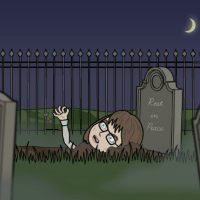Death defiance. It’s one of the more radical dynamics in mystical as well as magickal practice. Much of our awareness of life is touched by our awareness of our own mortality, and no matter what we are doing or how we live, we all have some sense of where we stand with death.
Death is everyone’s companion, but we don’t all relate to it in the same way. Some feel more at peace with it than others, but wherever you have come to stand with it, everything else in your life is colored by that.
Now one of the most defining dimensions of our perception, and thus our experience of life as a whole, is our sense of the immediacy of anything. We perceive those things we feel we are in immediate relationship with much more clearly than those things that we feel we will only encounter later, like say the immediacy of lunch versus the possibility of a dinner we might have two weeks from now.
I have a question for you friends. If death is something that might happen sometime later in your life, then what about life?
Life is what happens while you are making plans. Ah, life also becomes something that happens later? Yes. If death is just some abstract maybe, can life be any different?
So, all experience is “later”? Yes.
Our ancestors had a different relationship to the balance of life and death, and the oldest rituals of death defiance stem from their perception and the context of life as they lived it then.
Concept of heaven and hell? Before notions of heaven and hell. Those came about only later in the age of empires when people could begin to entertain the idea that they had a real reason to think about anything happening later at all.
The underworld was around for the Egyptians and Sumerians. Well, perhaps the way the perception of the underworld changed with time would be illustrative. Originally, the underworld was a place of mystery, and, honestly fear as well. Predators would appear to emerge from it and enter the world, but so did prey.
A place of retribution? Actually no, not a place of retribution at all, just a dimension of death and the unknown. Those who died in previous seasons were entered in sacred caverns and thought to return with the turning of the seasons in ways similar to the hibernation animals. Likewise, the heavens or sky seemed infinite and mysterious. Birds seemed to return from the very air itself.
So this began the sense of split. They knew that birds could die, but they didn’t seem to do the thing that resembled death as it was seen in other animals. When the birds left they couldn’t find their resting places, thus the heavens were perceived as an entirely different plane of existence.
Death and rebirth. Sounds like the Sweeny myth. Maybe it is. It’s hard for anyone these days to say anything for absolute certain, but we have plenty of traces of this history in our language and culture, as well as perceptual inheritance.
Your thoughts are welcome. Be well friends.
Travis Saunders
Dragon Intuitive
~science,mysticism,spirituality~

